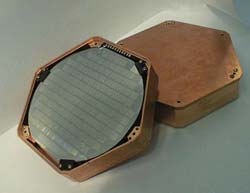McGill University researchers design and test computer games that enhance self-esteem
Can computer games help raise self-esteem? Absolutely. In a world-first study, researchers from McGill University’s Department of Psychology have created and tested computer games that are specifically designed to help people enhance their self-acceptance.
Available for public consultation at www.selfesteemgames.mcgill.ca, the games have catchy names such as Wham!, EyeSpy: The Matrix a
VLT Measures Properties of New Jupiter-Size Objects in Very Close Orbits
Discovering other Worlds
During the past decade, astronomers have learned that our Solar System is not unique, as more than 120 giant planets orbiting other stars were discovered by radial-velocity surveys (cf. ESO PR 13/00, ESO PR 07/01, and ESO PR 03/03).
However, the radial-velocity technique is not the only tool for the detection of exoplanets. When a planet happens to pass in front o
Since November, a physics experiment called the Cryogenic Dark Matter Search (CDMS II) has been looking for components of dark matter, the primary “stuff” of which the universe is made. Conducted from the Soudan Underground Mine in northern Minnesota, the search is for postulated dark matter particles called WIMPS–weakly interacting massive particles. So far, the experiment has found no WIMPs, but neither has it found contamination from stray neutrons. CDMS II member Priscilla Cushman, a physics pro

CDMS II presents new results on Weakly Interacting Massive Particles that could make up most of the matter of our universe
With the first data from their underground observatory in Northern Minnesota, scientists of the Cryogenic Dark Matter Search have peered with greater sensitivity than ever before into the suspected realm of the WIMPS. The sighting of Weakly Interacting Massive Particles could solve the double mystery of dark matter on the cosmic scale and of supersymmetry on the
Learning more about job applicant testing
“My approach to pre-employment personality tests has been zero tolerance vis-à-vis the obvious “crimes”–drug use and theft–but to leave a little wriggle room elsewhere, just so it doesn’t look like I’m faking out the test. My approach was wrong. When presenting yourself as a potential employee, you can never be too much of a suck-up.”
Nickel & Dimed, by Barbara Ehrenreich, page 124.
Learning if job applicants are faking and fin
By watching mice “dance” and comparing the DNA of the dancers to their flat-footed siblings, scientists have discovered a genetic cause of cleft lip and palate in mice, a finding that is already being used to search for a similar genetic defect in humans.
A team led by Rulang Jiang of the Center for Oral Biology at the University of Rochester Medical Center found that a gene known as Tbx10 is responsible for causing cleft lip and palate in mice. The group, which reported its results April 2